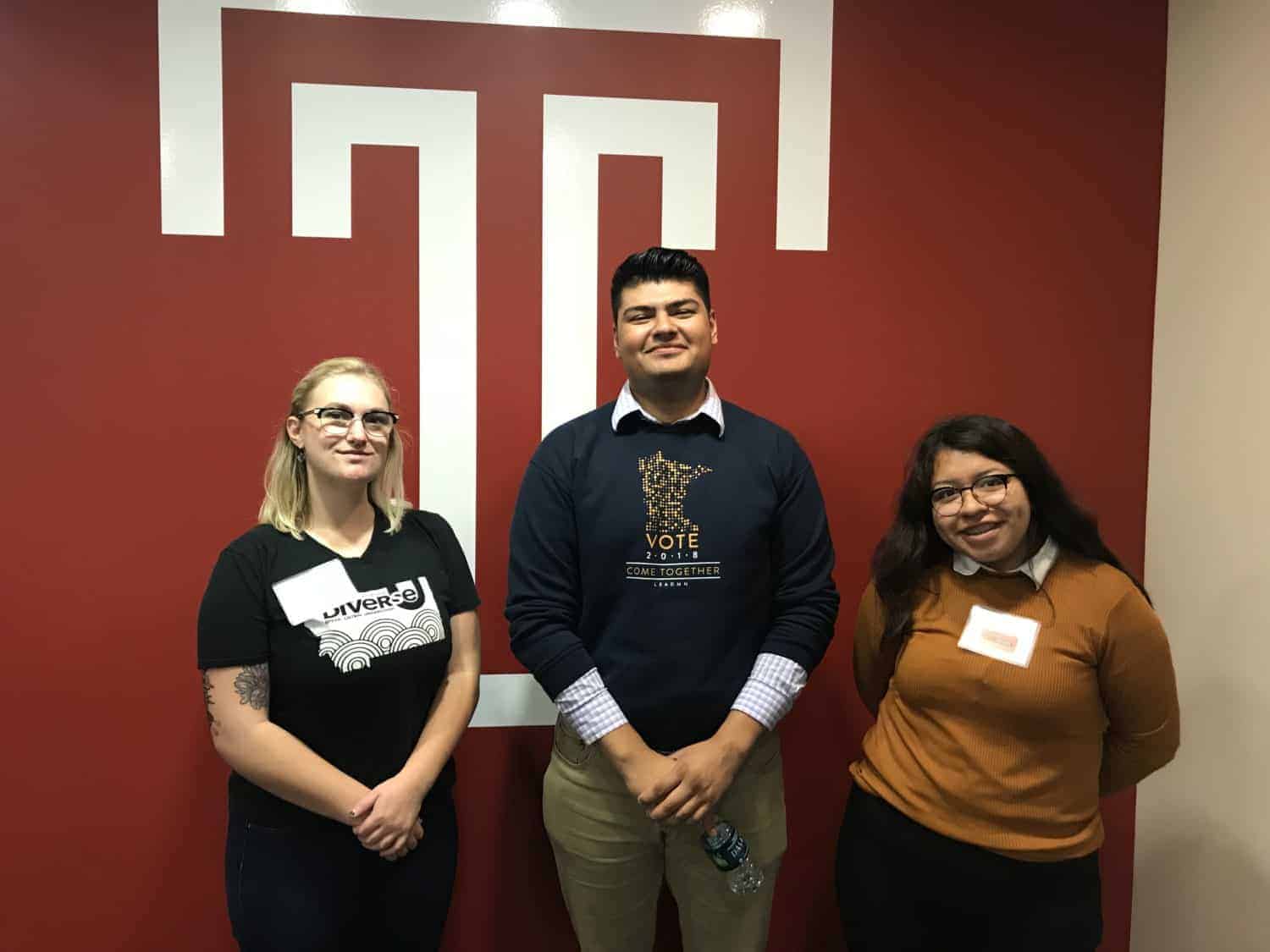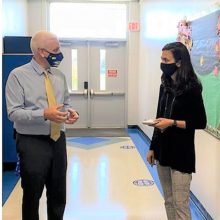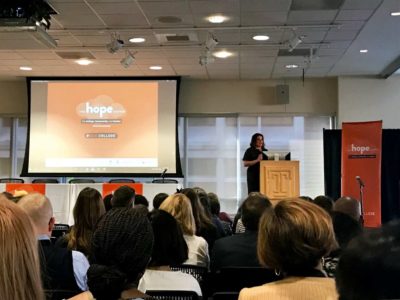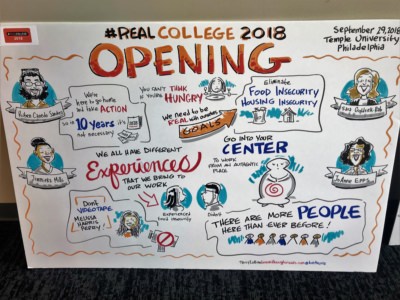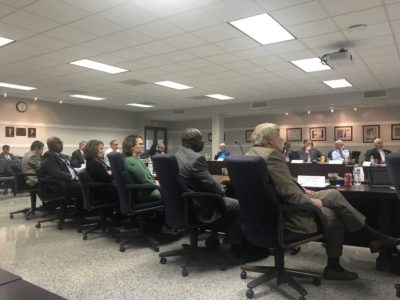Mariá Paz never thought she would visit a food pantry. She had a degree and a full-time job working at a bank in her birth country of Honduras. That lifestyle was secure — she was able to ensure her basic needs were met — but Mariá longed for the experiences and opportunities that the United States could provide.
That’s when she moved to Virginia and enrolled at Northern Virginia Community College, the second-largest community college in the U.S. with international students from over 180 countries. Mariá came with a plan; she had a budget. But then something unexpected happened — Mariá’s mother was diagnosed with Parkinson’s disease and no longer able to work. Between the cost of living in northern Virginia and her mother’s newfound medical costs, Mariá’s plan fell apart.
Suddenly, Mariá found herself struggling to make ends meet, and her student visa didn’t permit her to work full time. She fell into depression and struggled to meet the financial demands of out-of-state tuition, housing, transportation, food, and hygiene products.
Sometimes, she didn’t eat for two or three weeks at a time, saving the little money that she did have for transportation to get to class. Missing too many days of school could affect her visa status.
“How can I focus in college being hungry? As an international student, I have to be in 12 credits at a minimum so that my visa doesn’t get cut off. How can I maintain good grades and still be hungry?” said Paz. “Sometimes I had to give up transportation, or maybe I only ate the canned food from the pantry — high in sugar and sodium. Then when you don’t eat well, you don’t feel well, and then you don’t study well.”
Now, Mariá says she’s much happier than before but is still struggling. She works part-time at her college’s academic success center, connecting her classmates to tutors and other resources. In what time she has left, she tutors people in Spanish for extra cash. One of Mariá’s teachers helped her secure an emergency cash grant, and the college agreed to waive some of Mariá’s class requirements once they received her transcripts from Honduras.
“I’m still going through this — I still have to pick what to eat. But I’ve also become more creative — like okay, I’m not going to buy this, but I will buy ground turkey and eat it three times,” said Paz. “And I’m not ashamed anymore of going to the food pantry, and I’ll get canned tuna and things that don’t have so much sodium.”
Mariá plans to graduate with her A.A. in business administration in May.
“I had never, never visited a food pantry – never in my life – but you experience these things and they’re for a purpose,” said Paz. “They build you; at first you’re a rock, and I guess I’m polishing into a diamond.”
Mariá’s story is not all that unique. In 2015, the Wisconsin HOPE Lab, along with the Healthy Minds Study, surveyed over 4,300 students from 10 community colleges that reflected the broad composition of the country’s community college population. One in five of those students said they had gone hungry in the last month due to a lack of money, and 13 percent had experienced some form of homelessness in the last year. Over half of these students were at risk for each of those conditions despite the majority of them having jobs and financial aid.
At the end of September, over 500 people gathered in Philadelphia for the third Real College convening to discuss these exact issues — more and more of our country’s undergraduates are facing unprecedented barriers to success due to poverty, often making decisions between paying for tuition and textbooks or buying groceries for the week. It was here that I met Mariá and other students willing to share stories of their real college experiences.
Kassandra Montes
After experiencing domestic violence, Kassandra Montes, a student at Lehman College in the Bronx, moved into a shelter with her four-year-old daughter. With no family in New York, Montes had few support systems to turn to and was embarrassed to tell her friends about her situation.
“People just seek all these expectations from you, and there’s no room in your head for failure — but you are failing,” said Montes.
Now, as a member of Lehman College’s student government, Montes advocates on behalf of students experiencing similar basic needs insecurities. She’s working to reduce the amount of food waste generated by the college’s cafeterias and keeps her office door open to everyone who needs a safe space.
“Some students are embarrassed to take food from the food pantry, so I go down to the food pantry and take food for myself and for them. If you feel embarrassed, I have an extra bag just so you can say you went to Walgreens instead of going down to the food pantry,” said Montes.
Kat Cowley
Kat Cowley, a master’s student at the University of Montana, became homeless last year after leaving an unsafe relationship and living situation. Through that process, she learned what resources were available to students on campus and what was missing — there was no food bank or emergency housing program. As a member of student government, Cowley is now working on establishing a food pantry and creating more resources for homeless and housing-insecure students.
According to Cowley, it is incredibly hard just to get students to walk through the door when they’re struggling. She works to change the conversation on campus about hunger and homelessness by sharing her own story.
“If I was a recent assault survivor, and homeless, and sitting through final budgeting in the [student government] senate — anyone could be homeless. You don’t know what it looks like,” said Cowley. “A lot of our staff are on food stamps and facing homelessness as well — you just don’t know.”
Frankie Becerra
Frankie Becerra, a first-generation college student who attended Century College before transferring to the University of Minnesota, experienced food insecurity throughout the beginning of his college experience.
“I was living as many students do who have responsibilities outside of college — 6 a.m. to 3 p.m. work, 3 p.m. to 6 p.m. study, 6 p.m to 9 p.m. class. In that space, there’s no room to advocate,” said Becerra. “You get stuck in this vicious cycle if you’re in this bad situation, and you don’t have people there to represent you.”
Now, Becerra serves as the president of LeadMN, a group that represents 180,000 two-year college students from across Minnesota. Becerra described the group’s three-pronged approach to addressing basic needs insecurities among college students:
- The now: creating a food pantry on every campus in Minnesota is one of the group’s immediate goals.
- Education: making sure students are aware of all the resources that exist on their campus.
- Looking at systemic and institutional solutions to basic needs insecurities.
“Just because it’s not your problem doesn’t mean you can’t be part of the solution,” said Becerra.
Maritza Lopez
Maritza Lopez’s father lost his job when she was 10 or 11 years old, causing her family to experience a financial crisis. Throughout high school, Maritza adjusted to living in tight quarters, often sharing a single-room apartment in Los Angeles with as many as nine or 10 family members who all chipped in to afford rent.
Then, Maritza’s family experienced domestic violence, resulting in a court process and landing her brother in jail. All of these moving pieces prompted Maritza to compartmentalize her life, so work, school, and home life wouldn’t mix.
As a student at Santa Monica Community College, Maritza campaigned for a position in student government and was elected. Her responsibilities were primarily to manage the student clubs on campus. But then Maritza was evicted.
“I was still homeless when I was doing student government. I had two part-time jobs. I was a full-time student. And from there I was trying to figure things out,” said Maritza. “I would hang out a lot in the den area – a food pantry that opened at 7 a.m. I’d be on campus early at 5 a.m. I remember this one time at 3 a.m. and it was super dark and I was just there for free WiFi, typing my essay.”
When an administrator asked Maritza why she was always on campus so early, the compartmentalization of her life shattered around her. She broke down and explained that she had nowhere to stay.
From there, Maritza’s role in student government shifted to include advocacy for student success. She started making announcements in student government and talking about the resources that the college has on campus. She advertised the food pantry, the local farmer’s markets, and information on how to access food vouchers. Maritza’s advice for college students experiencing similar barriers is:
“If you’re alone, surround yourself with people. It’s okay to be in the library. Sometimes just the sound of people’s voices will help you. Try to get involved, even if it’s just clubs. If you’re not ready to open up and tell people your story, eventually you’ll find people.”
